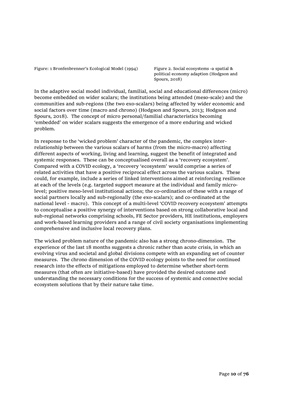
Page 10 of 76
Figure: 1 Bronfenbrenner's Ecological Model (1994) Figure 2. Social ecosystems -a spatial &
political economy adaption (Hodgson and
Spours, 2018)
In the adaptive social model individual, familial, social and educational differences (micro)
become embedded on wider scalars; the institutions being attended (meso-scale) and the
communities and sub-regions (the two exo-scalars) being affected by wider economic and
social factors over time (macro and chrono) (Hodgson and Spours, 2013; Hodgson and
Spours, 2018). The concept of micro personal/familial characteristics becoming
'embedded' on wider scalars suggests the emergence of a more enduring and wicked
problem.
In response to the 'wicked problem' character of the pandemic, the complex interrelationship
between the various scalars of harms (from the micro-macro) affecting
different aspects of working, living and learning, suggest the benefit of integrated and
systemic responses. These can be conceptualised overall as a 'recovery ecosystem'.
Compared with a COVID ecology, a 'recovery 'ecosystem' would comprise a series of
related activities that have a positive reciprocal effect across the various scalars. These
could, for example, include a series of linked interventions aimed at reinforcing resilience
at each of the levels (e.g. targeted support measure at the individual and family microlevel;
positive meso-level institutional actions; the co-ordination of these with a range of
social partners locally and sub-regionally (the exo-scalars); and co-ordinated at the
national level - macro). This concept of a multi-level 'COVID recovery ecosystem' attempts
to conceptualise a positive synergy of interventions based on strong collaborative local and
sub-regional networks comprising schools, FE Sector providers, HE institutions, employers
and work-based learning providers and a range of civil society organisations implementing
comprehensive and inclusive local recovery plans.
The wicked problem nature of the pandemic also has a strong chrono-dimension. The
experience of the last 18 months suggests a chronic rather than acute crisis, in which an
evolving virus and societal and global divisions compete with an expanding set of counter
measures. The chrono dimension of the COVID ecology points to the need for continued
research into the effects of mitigations employed to determine whether short-term
measures (that often are initiative-based) have provided the desired outcome and
understanding the necessary conditions for the success of systemic and connective social
ecosystem solutions that by their nature take time.